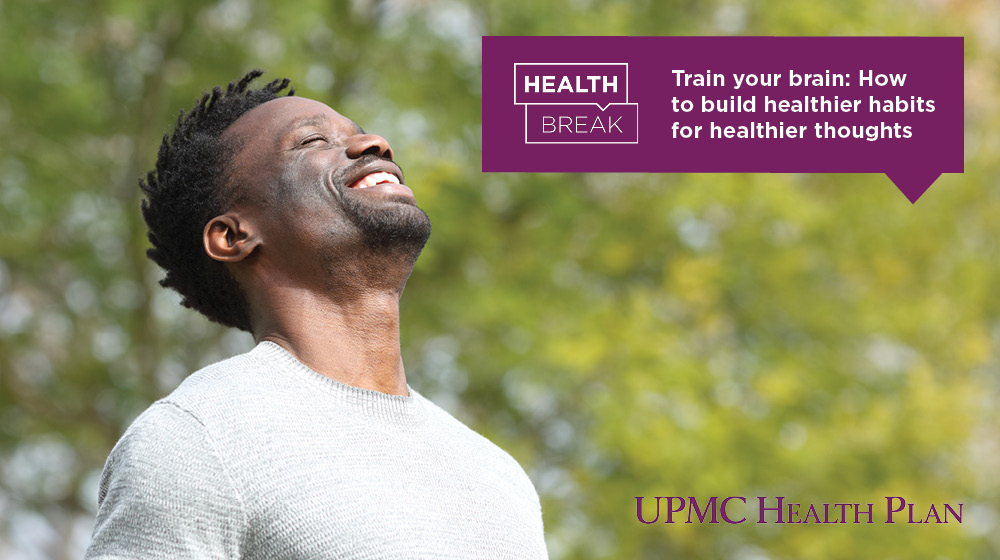Health Break: Train your brain: How to build healthier habits for healthier thoughts

A podcast for UPMC Health Plan members, Health Break is your quick guide to caring for your mental and physical health, prioritizing wellness, and making the most of your health insurance plan.
Episode 8: Take a Health Break with Laura Francis
Laura takes a Health Break with us to explain how the brain works in moments of discomfort—and how we can build habits for healthier thoughts.
Episode transcript:
Camille: Welcome to Health Break by UPMC Health Plan, your quick guide to health, wellness, and how to make the most of your health insurance plan. Listen during your coffee break, lunch break, or anytime you need a break. I’m your host, Dr. Camille Clarke-Smith. I help to oversee the quality of the plans we offer at UPMC Health Plan.
Alex: And I’m your co-host, Alex Treanor. I’m a senior health coach who works with our members on healthy lifestyle habits and goals. This is your… Health Break.
Alex: Hi everyone! I’m Alex Treanor. Today we’re joined by Laura Francis. We’re talking brain bootcamp and strategies to help you have healthy and positive thoughts.
Laura, thank you so much for joining us today.
Laura: Thanks for having me.
Alex: What role does our brain play in our mental health?
Laura: Yeah, so our brain plays a very important role in our mental health because the stress response begins in the brain. Just as the brain is in charge of all functions of our body, it also oversees our thoughts, our feelings, our behaviors. And because each of us is unique, we process things differently and we respond differently to challenging or difficult situations. So what’s stressful for one person may not affect another person at all. For example, two people may be in the same traffic jam. One person may listen to music enjoyably while the other honks their horn feeling angry, intense. Same situation, different stress response. And it’s all driven by how our brain perceives the situation.
Alex: The way we think about things really makes a difference. How can we train our brain to have healthier thoughts?
Laura: We can start training our brain to have healthier thoughts first by just developing an awareness of our thoughts. There are things called thought distortions, which are negative thoughts that are based on our perceptions of a situation, but they don’t always accurately reflect reality. We might even develop patterns of negative thinking that are so automatic that we don’t even realize we have them. And this can lead to anxiety and depression. Jumping to conclusions, all or nothing thinking—these are examples of thought distortions. And the example I always like to give is, suppose you’re walking through the mall and you see somebody you know and say hello and they don’t respond. If you think to yourself, what did I do to get them mad at me? How did I offend them? Then this could lead to feelings of anxiety and stress. However, if you just think, oh, they probably didn’t hear me, and you go on your way, you’re much less likely to experience that level of anxiety.
We really can train our brains, though, to develop healthier ways of thinking. Like many things, though, practice makes perfect. Here are some things that our listeners can do to get started. First, practice self-compassion. Don’t judge yourself for how you’re feeling or why you’re feeling that way. Celebrate small successes. This can build confidence and increased positive thoughts in challenging situations. And practice gratitude. Remind yourself of the things that you are thankful for and draw upon the good things in your life to help you get back into a positive space. Practicing gratitude is a form of changing our thoughts from negative to positive and can really help us feel better.
Now when it comes to training your brain, what works for one person might not work for someone else. So keep trying different techniques and see what works for you. And if you need help getting started, at UPMC Health Plan we have behavioral health clinicians who can help you.
Alex: Thank you so much, Laura, for taking a Health Break with us today.
Laura: Thanks for having me.
Alex: Practice building these and other healthy brain habits for healthier thoughts. Find show notes and more information at upmchealthplan.com/podcast. Join us as we explore other health and wellness topics in the next episode of Health Break.
This podcast is for informational and educational purposes. It is not medical care or advice. Individuals in need of medical care should consult their personal care provider. Views and opinions expressed by the hosts and guests are solely their own and do not necessarily reflect those of UPMC Health Plan and its employees.
Related to this episode:
- Get connected to tools and programs to support your mental health based on your coverage type.
- Download RxWell.
- Get one-on-one behavioral health coaching over the phone by calling UPMC Health Plan Behavioral Health Services at 1-888-777-8754. TTY users should call 711.
About Laura Francis:

Laura Francis has more than 25 years of behavioral health experience working in community mental health and managed care settings. Presently, she is Director of Behavioral Health Clinical Programs at UPMC Health Plan, where she manages the behavioral health coaching and case management team and is responsible for program development focused on supporting the emotional health and wellness of UPMC Health Plan members. Laura earned a bachelor’s degree in Psychology from the Pennsylvania State University and a master’s degree in Social Work from the University of Pittsburgh. She is a licensed social worker in the Commonwealth of Pennsylvania.
About Dr. Camille Clarke-Smith:

Camille Clarke-Smith, EdD, is a program director in the Quality Improvement, Medicare Stars Department at UPMC Health Plan, where she leads the Medicare Faith and Wellness Program, a 3- to 12-week health and wellness challenge. She is also the founder of the nonprofit Transforming the Health of African American Women (THAW) Inc. She earned a doctorate in health and physical activity education from the University of Pittsburgh in addition to a master’s in exercise science and a bachelor’s in psychology and sociology. She is currently pursuing her master’s degree in social work at Carlow University.
About Alex Treanor:

Alex Treanor is a lead health coach at UPMC Health Plan. As a lifestyle health coach, she specializes in helping you lose weight, eat healthy, get more physical activity, be less stressed, and quit tobacco. Alex has a master’s in Kinesiology, Integrative Wellness from Point Loma Nazarene University. She has been coaching since 2014 and is a Nationally Board Certified Health & Wellness Coach and Certified Personal Trainer. Alex is passionate about helping people improve their relationship with food and exercise while creating healthy, sustainable routines filled with enjoyment. Alex enjoys spending time with her husband, walking with her dog, and eating tacos in the sunshine.



